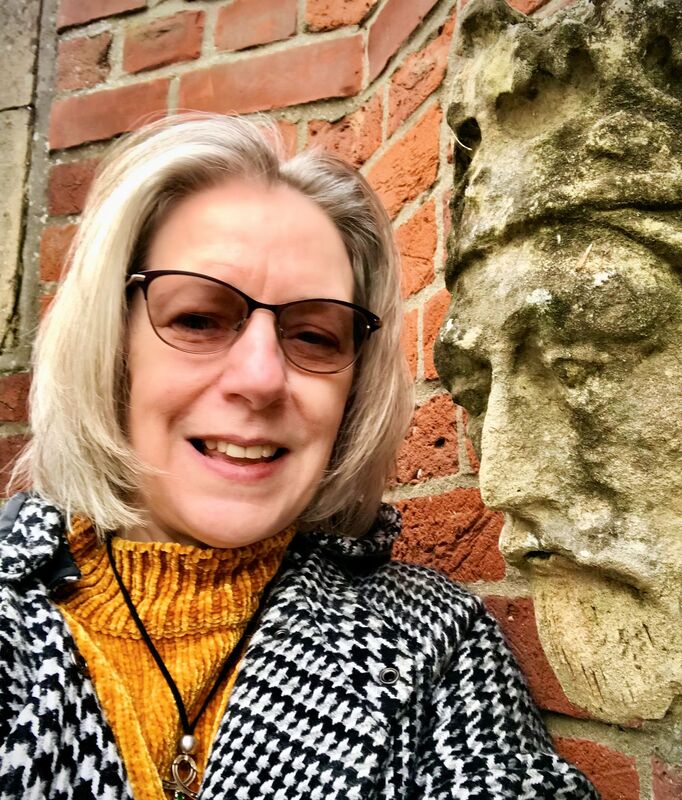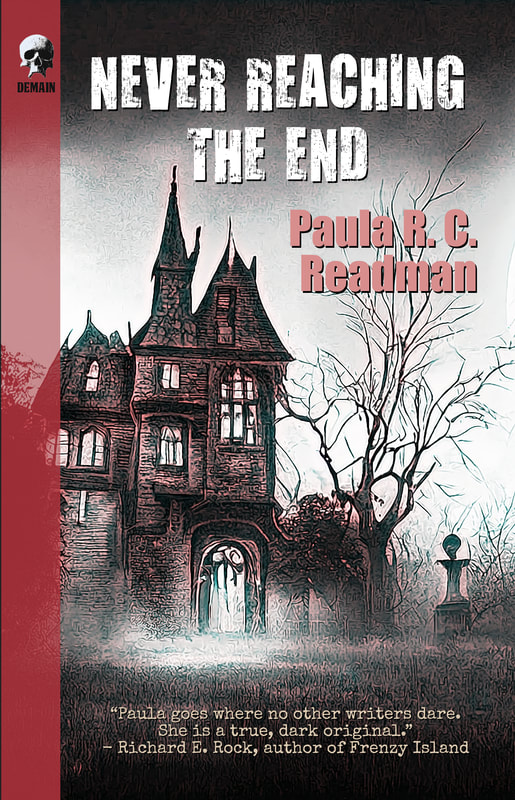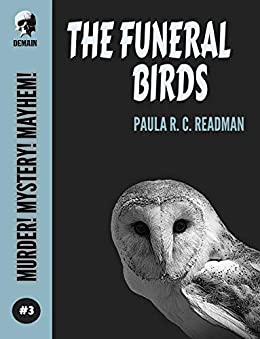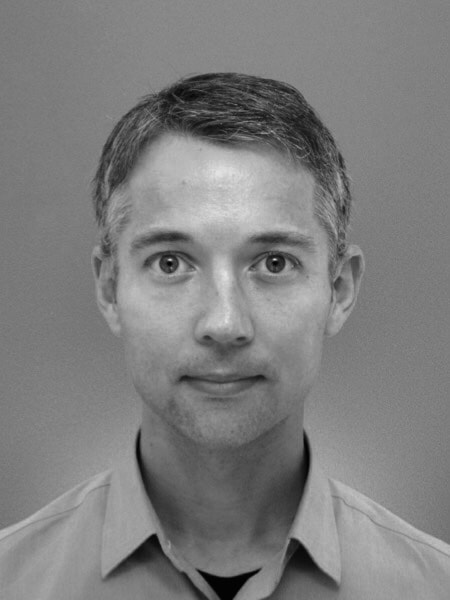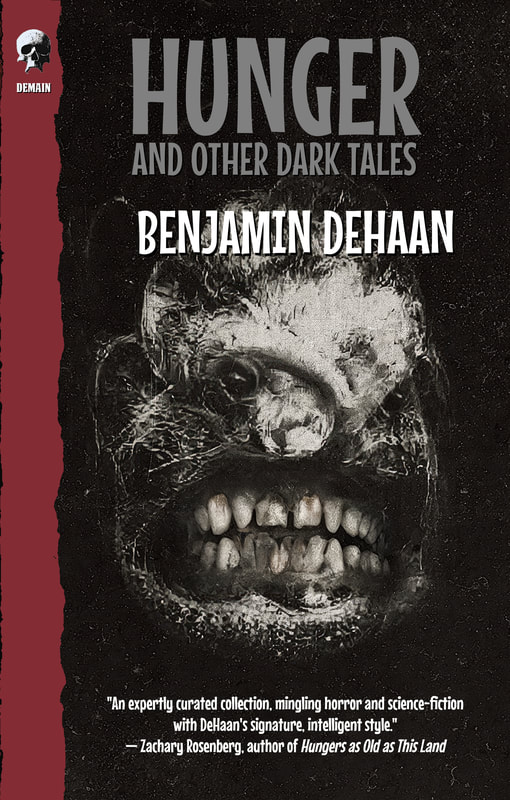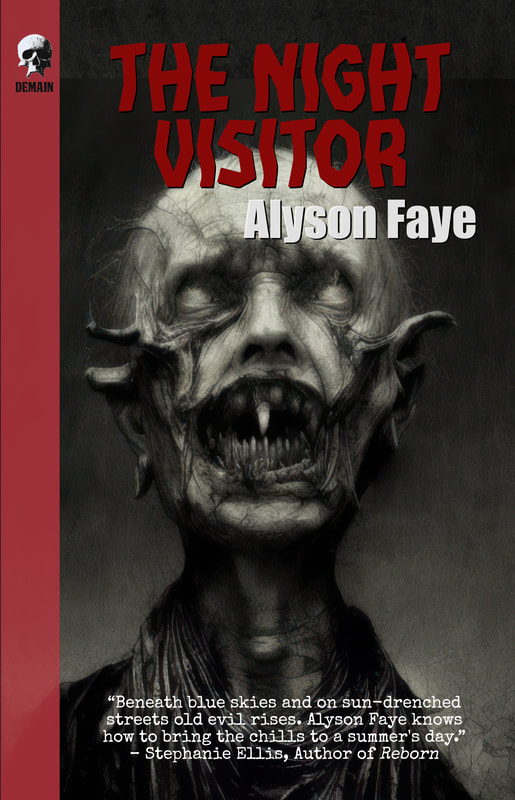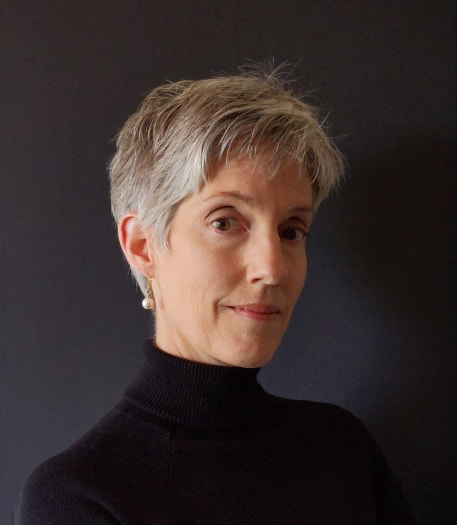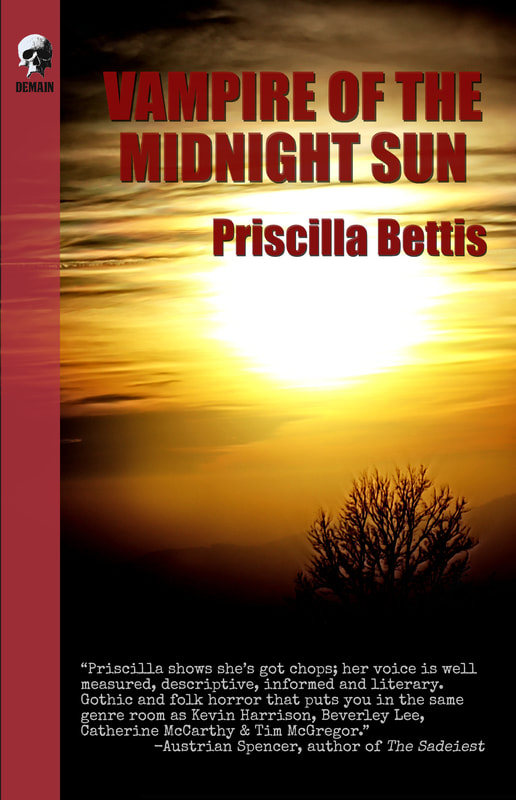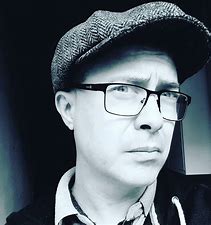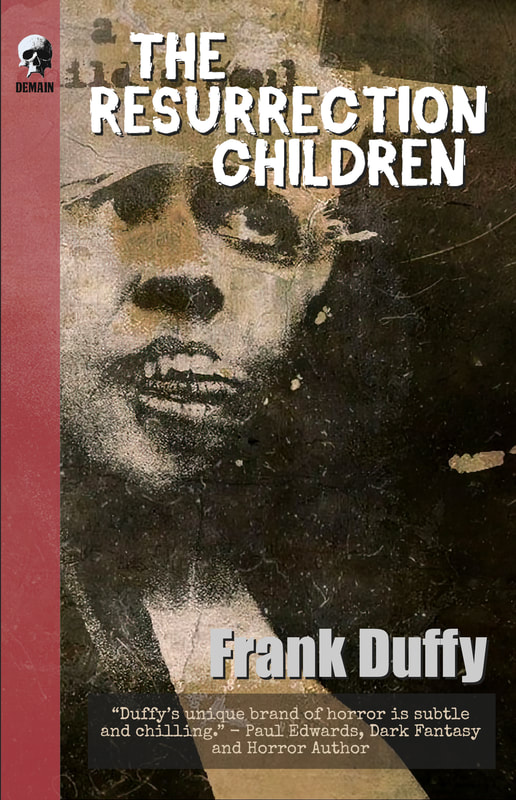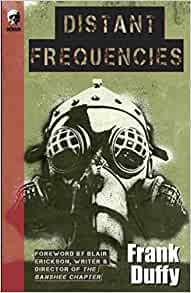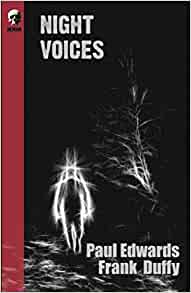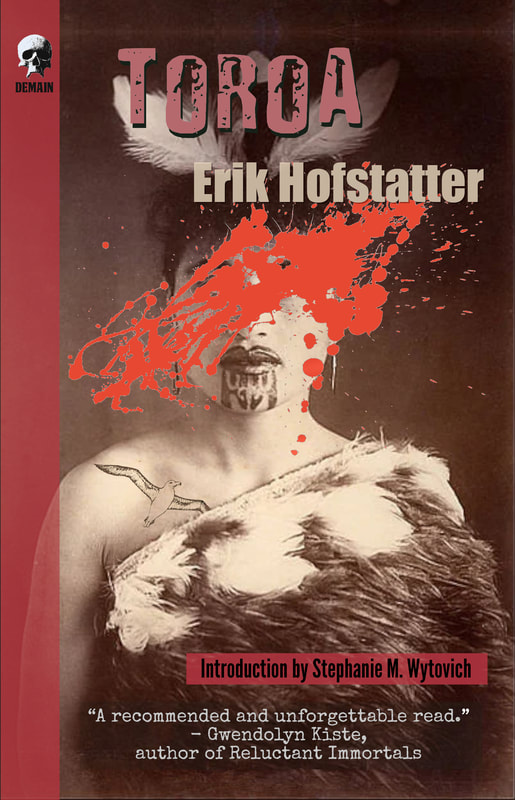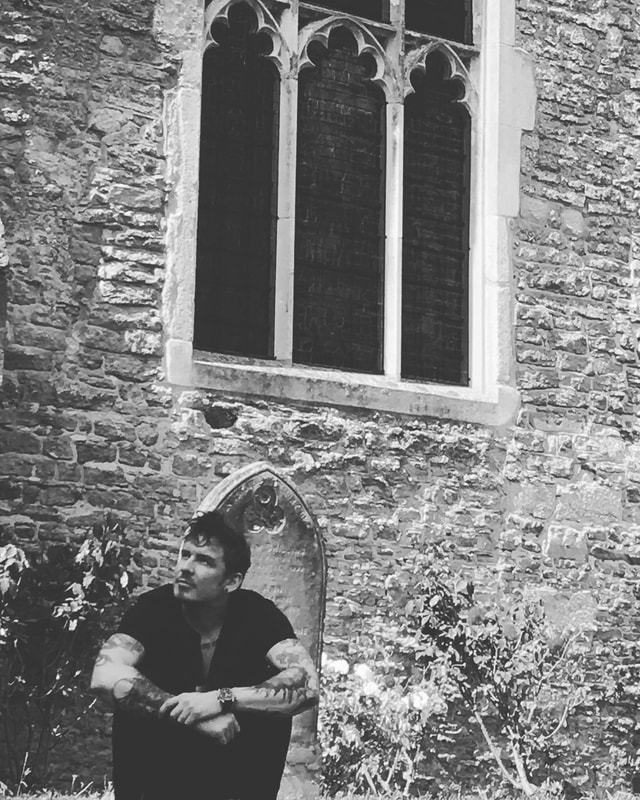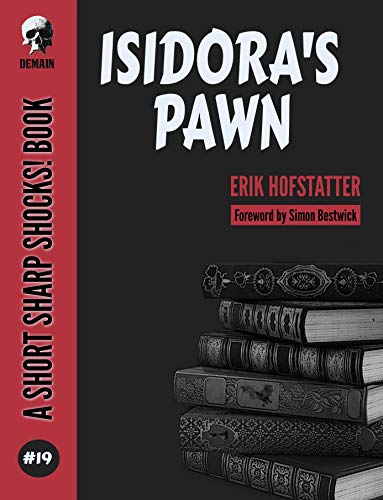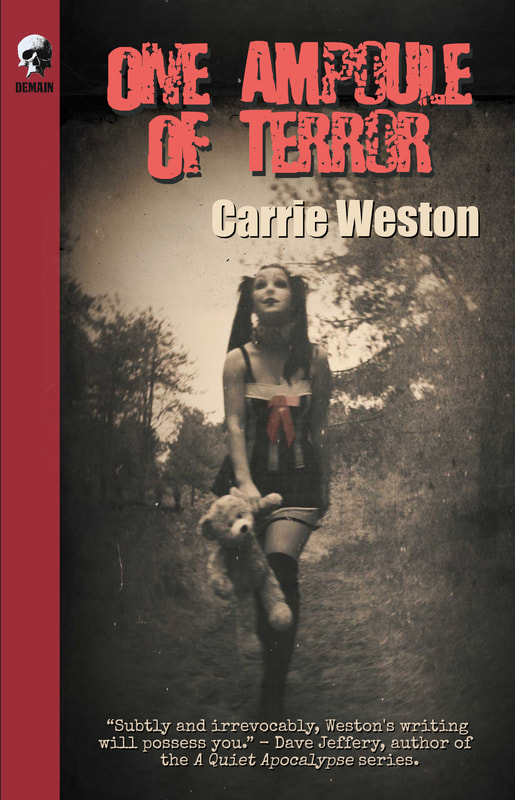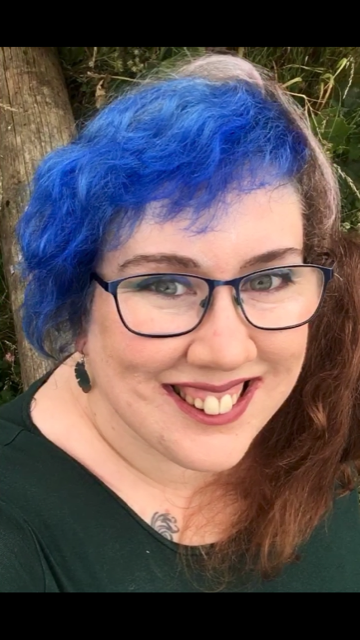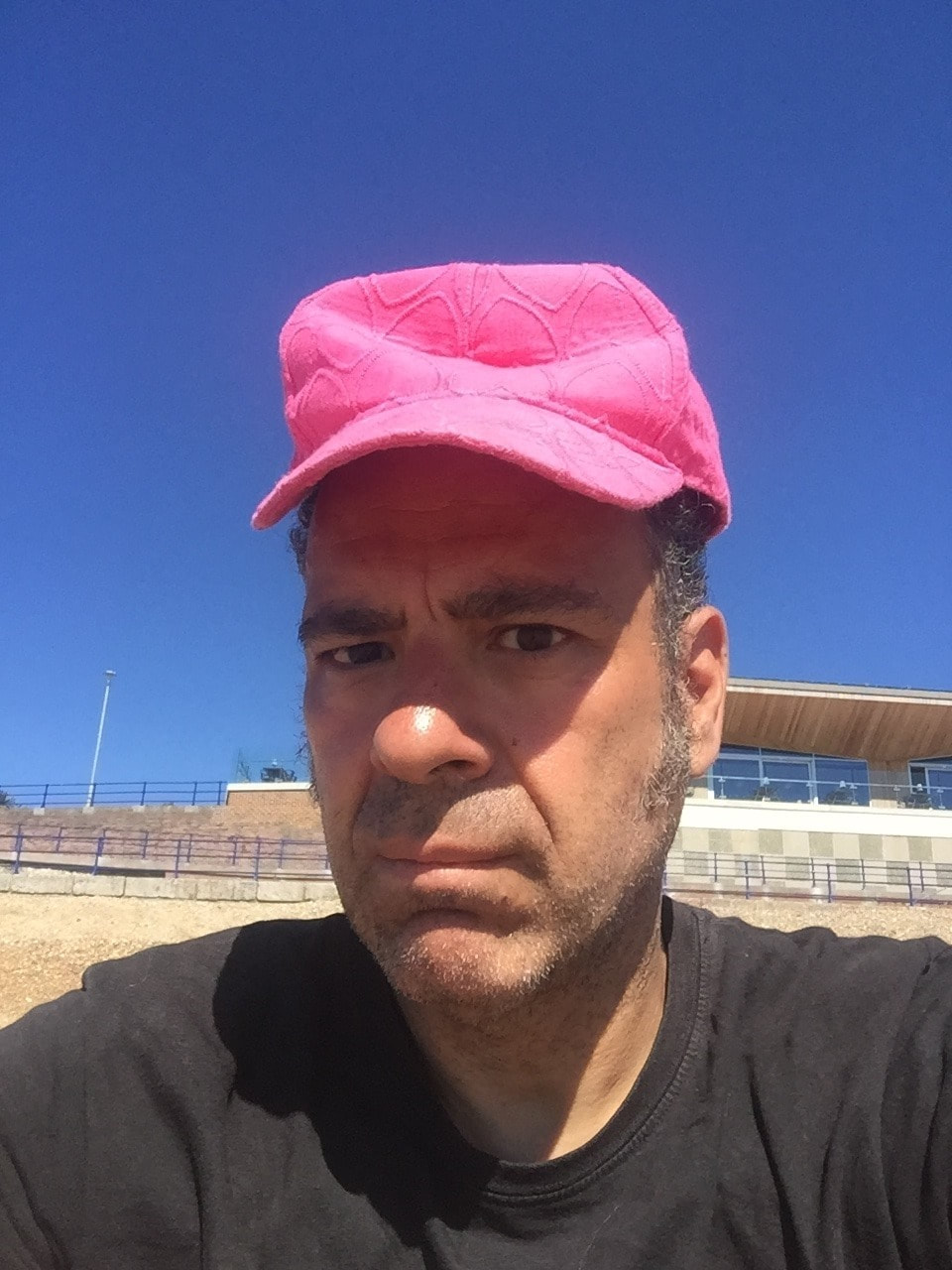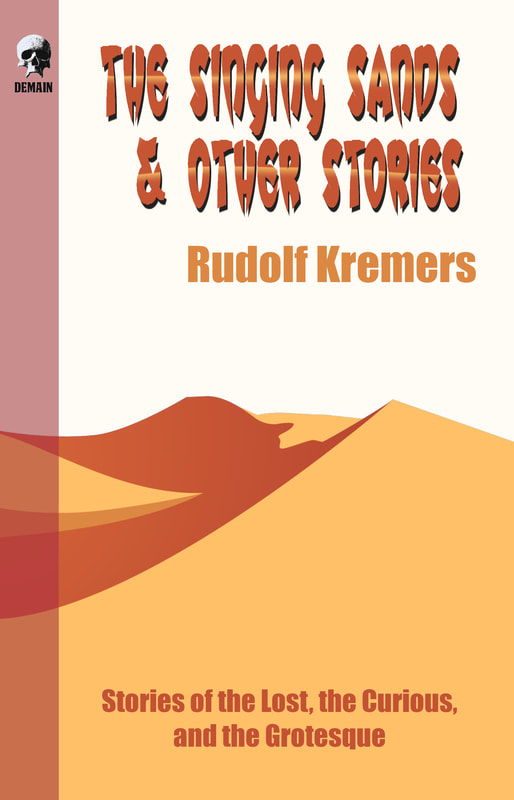|
|
|
April 28th sees the publication of Paula R.C. Readman’s novella Never Reaching The End (cover by Adrian Baldwin). This is her second DEMAIN release, following on from her Murder! Mystery! Mayhem! title, The Funeral Birds. Prior to publication Dean and Paula had a good old natter.
DEMAIN PUBLISHING: Hi again Paula, hope life isn’t treating you too badly. Great to be working with you again, so let’s get down to it – for those that don’t yet know you could you tell us a little about yourself and why you became a writer. PAULA R.C. READMAN: Hi! How do I make myself sound interesting on the outside when all I have to offer is a dark mind? I left school poorly educated and worked in factories, got married, and had a son. The first marriage broke down so I went back to work to support my son and myself, met a wonderful man and married ten years later. My husband allowed me to focus full-time on my writing when redundancy happened to me for the third time in my working life. For about 20 years, I’ve been writing to be published and started, as most writers do by writing a novel. I soon learnt that wasn't the best way to start, and set the rejected books to one side and began writing short stories. Once these began to be published, I went back to novel writing. In 2020, DEMAIN Publishing published my first book, The Funeral Birds. DP: Indeed we did and we had great fun doing it. Let’s talk about your background… PRCR: My first love has always been art, and became the inspiration to write Stone Angels. The book tells the story of an artist called James Ravencroft. I wanted to get into Art College, but my lack of education meant I failed the entry exam. Evening classes were too expensive for me, so I borrowed library books. That's when I fell in love with the Pre-Raphaelite artists and their stunning paintings. Each picture tells stories if you understand the symbolism in them. Reading about the artists and their lives led me to research the authors and poets of the Victorian era, as many of the Pre-Raphaelite artists found inspiration from poems and literature. DP: That’s very interesting. I’ve also wanted to do an art history course, you’ve inspired me to do it now. So what was your first introduction to the horror genre? PRCR: I’ve been fascinated with the dark side from a small child. I’m named after a dead brother called Paul. I saw children in our house that weren’t there. When I asked my older brother, Mark about them, he said we were the only children there. When I told my grandmother about them, she told me not to repeat what I had said to anyone, so I didn’t. In my junior school, a group of children used to play a game where they could lift another child with their little fingers. ‘This is the Power of Levitation. Sound and silence must not be broken. She looks ill, she is ill she looks dead, she is dead,’ was sung by each person in the circle, and then together, we would lift the girl above our heads. I had an Ouija board until my mother burnt it. This led me to read anything to do with the supernatural, including fiction, like Stephen King, and the Tales of the Unexpected, written by Roald Dahl in the local library. I’m more of a Gothic Horror lover than blood and gore. DP: Fascinating! I don’t think I knew that about you – wow. Okay, I’m a little bit scared now (in a good way I think!). Let’s move on to your novella… PRCR: Never Reaching the End is meant to be part of a three-book horror submission to an Australian publisher I'd worked with previously. They were doing a call-out for a series of horror books and wanted a short story for three themes, House, Ship, and Space. I missed the deadline because I was busy editing a novel. An American anthology accepted my space tale. I still have the ship story on my computer. Never Reaching the End is my take on the haunted house storyline. DP: Interesting and happy for us that you did miss your deadline! What would you say was your biggest creative success thus far? PRCR: The Funeral Birds, I think as was unexpected. I originally wrote it for a BBC short story competition but wasn't successful. My neighbour Joan kept pushing me to resubmit it to other places. It was only when Alyson Faye contacted me to say that DEMAIN was doing a call-out for crime I submitted to you. The Funeral Birds, with my other four books, are now available in libraries in Essex. DP: Yes Alyson did recommend you highly. I’m happy that other publishers have been working with you and recognising your talent – well done. What books/authors do you read and are they an influence? PRCR: I read an eclectic collection of genres and authors from Victorian writers to Agatha Christie and beyond. The one thing I look for in all books is a twist in a tale, and something that I wasn’t expecting. At my age, I have been reading regularly all my life. I loved Anne Rice's Interview with a Vampire, and Flowers in an Attic by V.C. Andrews for their originality. The Ghosts of Thorwald Place by Helen Power is one of the best books I've read lately. DP: I love Anne Rice’s work – haven’t heard of Helen’s book but will check that out asap. So, what scares Paula… PRCR: Three things that horrify me the most are rats, the thought of being buried alive, and handling sheets of glass, which makes me feel sick. As for rats, I grew up next to a flour mill. My father was a master miller and explained the importance of keeping the mill clean because if the rats' droppings or urine got into the flour, it would be unfit for human consumption. As a child, I learnt about the link between the Black Death and rats, which added to my fear of them. We lived in an old cottage; I could hear rats crawling in the walls as a child. So far, I haven’t written about glass, rats or being buried alive, but thinking about them, helps with describing the emotion of fear or panic. DP: Oh my Lord – you’ve definitely got to write that book!!!! Which leads me onto: creatively is there anything you’d like to do but haven’t done yet? PRCR: I would love my books to appear on bestselling lists and in shops, but all writers hope for this too. I’m working hard to make it happen, so fingers crossed. I’m busy creating the first novel in a series of books. It is still in the plotting stage, so I want to take it one book at a time and see how it develops. I’m not very good at working under pressure. I tend to panic, which isn’t helpful and stops my mind from developing new ideas. DP: So writing is definitely your long-term career? PRCR: I've always planned for my writing to be a long-term career. Will I always write horror, I'm not sure. I might run out of ideas that excite me enough to continue writing in this genre. I don’t see myself writing romance any time soon. As I've said in a previous question, I'm working on writing a series of supernatural crime books. I have plenty of ideas, but until I've completed the foundations in the first one, and made the leaps in time believable in my mind, I can’t begin writing the rest. DP: Great to hear – keep at it for sure! So final question, what is something your readers might be surprised to find out about you? PRCR: I have a motorbike licence. I was a bit of a wild child in my youth. I love the natural world and enjoy photographing fungi, graveyards, and churches, and I have Viking blood in my veins. I can’t watch X-rated movies because they scared me, too. And on that note – thank you Paula, the best of luck with Never Reaching The End. If you’d like to connect with Paula direct: Blog: https://paularcreadmanauthor.blog Facebook: https://facebook.com/paula.readman.1 Twitter: Paula R C Readman@Darkfantasy13 Amazon Author’s Page: https://www.amazon.co.uk/Paula-R-C-Readman/e/B00A9UHMSO
0 Comments
March 31st sees the publication of Hunger And Other Dark Tales by Benjamin DeHaan – a new addition to the DEMAIN family. The collection contains five chilling stories – the cover is by Adrian Baldwin, the cover image by Dark Artist Roberto Segate. As 2022 came to an end, Dean and Benjamin chatted all things Hunger…
DEMAIN PUBLISHING: Welcome Benjamin, welcome. I really enjoyed reading your collection – for those out there who perhaps aren’t familiar with you or your work, could you tell us a little about you… BENJAMIN DEHAAN: Hello and yes, of course. I was born and raised in southern Wisconsin, USA but have been working and living in Japan for more than ten years. I mostly became a writer because I have always enjoyed stories in all mediums and am curious on how works of fiction are created at the more micro level. I am still fascinated today on the process and learn new things all the time. DP: So would you say your background has had some influence on you as a writer? BD: My background is Sustainability (Circular Economy), International Trade, Japanese Language, and Asia Culture Studies, but I feel they don’t influence my writing for the most part (maybe they do subconsciously). Other works of genre fiction, film, and music that move me in some way have a much deeper impact on the types of stories I produce. Especially music these days. DP: Ah, I’m with you there – music is so important to me as a creator. It’s odd that when I re-read my older work I know instantly what songs/artists I was listening too at the time. For a school thesis I wrote a piece about James Herbert’s The Magic Cottage but at the same time was listening to a cd by Alyson Moyet – they have now become so intertwined in my consciousness. Anyway, anyway – what would you say was your first introduction to the horror/fantasy genre? BD: The Hobbit and the Redwall Series sucked me into the fantasy genre at a young age, and I have always been a huge fan of the Final Fantasy video game series and the music. When it comes to horror, the film Leprechaun (haha) and The People Under the Stairs are my earliest memories. I am a later boomer when it comes to horror fiction however. The Walking Dead comics introduced me to great horror storytelling and interesting/complex character dynamics. The Road by Cormac McCarthy and The North Water by Ian McGuire taught me the power of dark fiction and sentence-to-sentence structure importance to conjure up certain feelings in the reader. DP: Some great titles there for sure – I love The People Under The Stairs and have some experience of the Final Fantasy series too (used to play it with my brother). So, Hunger And Other Dark Tales… BD: This collection includes the first five horror short stories that I have ever published. A variety pack of contemporary, historical, and science fiction horror. I would like to say more, but I don’t want to spoil too much. (I will say that the one I am most proud of and my personal favourite is “Aarav’s Ascension”) DP: Yes, I liked that one too (I liked them all obviously!). Did you have to do much research when writing the stories? BD: Yes, I did a lot of research if I lacked knowledge on certain aspects of a scene. The motivation to nail a dramatic beat or hammer the beginning or ending is the only thing that pulls me through the slog of Mr. Google data mining. The slog is important though, especially for historical fiction. DP: It is – having writing a couple of period drama scripts (and I’m in the middle of two as we speak) I know that it can be a slog at times, but so important! What would you say was your biggest creative success to date? BD: I would say the biggest success, no matter the case, is becoming intoxicated with the art I am creating, losing a sense of reality, and becoming wholly and fully transported to a different world in my conscious. Success in writing for me is gauged by how much I enjoyed the actual writing process/experience of a particular story/chapter/scene, etc. There are stories I have published that I feel are inferior in that regard to stories I haven’t published due to the different writing experiences I had with them. DP: Interesting and again I agree from my own personal writing experience. What would you say draws readers into our genre? BD: I can’t speak for everyone, but what I think most readers like about the horror genre is slow building tension as you progress to the end of the story and the sense that something very bad is going to happen, but it is not totally obvious what that thing is, or when it’s going to occur. It’s great when the ending you have in your mind is totally different from the author’s. (And their ending still works!) DP: It does! Okay, final question. For you is writing a long or short term career? BD: I would say it is not a any kind of a “career” for me but more of a “lifelong, spiritually fulfilling hobby” at the moment. If it pans out into something bigger than I imagine, that would be great. If not, that’s ok too. In the end, I just want to look back and see that I’ve created works that I am proud of. What a great place to finish. Thank you for your time Benjamin and the best of luck with Hunger And Other Dark Tales. If you would like to connect with Benjamin direct: Website: https://www.benjamindehaan.net Twitter: https://twitter.com/benjamin_dehaan Facebook: https://www.facebook.com/benjaminldehaan We welcome Alyson Faye back to DEMAIN with her horror novelette The Night Visitor, published as an ebook 31st March. The cover design is by Adrian Baldwin; the cover image by Dark Artist, Roberto Segate. Early 2023, Dean and Aly sat down and talked.
DEMAIN PUBLISHING: Hello Aly, happy new year to you – welcome back. Hope everything is going okay with you. So, you’re no stranger to these interviews – let’s go for it: Can you please tell us a little about yourself and how / why you became a writer. ALYSON FAYE: Hi! Yes – of course: I loved stories, in books, and films; consumed books by the bucketload growing up and dreamed of telling stories which would one day be read by others. DP: Do you think your background influenced you as a writer? AF: I’ve had a few jobs over the years, but often they’ve involved working with children or young people - teaching literacy and sharing my love for reading and stories. DP: Which nicely brings me to your first introduction to the fantasy/horror genre… AF: Yes, it was probably Penelope Lively’s ‘The Wild Hunt of Hagworthy’ aged about 7 or 8. DP: Wow. An early starter. SO, your novelette: AF: It’s set in the super sweltering British summer of 1976, one I well remember, in a small town, like the suburb I grew up in. It entwines history, myth, folklore, archival research, a showdown at a hilltop caravan site, a madman who creates a monster, a strange plague, a night army, and a coming of age story thrown in too. Yes, we’re talking … vampires. DP: Personally I really loved it, well up my street – it reminded me of some great novels as I read as a kid. You mentioned ‘Wild Hunt’ but were there any other influences… AF: I love a good Gothic mystery, like the ones Rhiannon Ward, Anita Frank, Sally Hinchcliffe, Alison Littlewood and Carly Reagan write. DP: Some great names. Let’s think about this – what does horror (or even fantasy) mean to you? AF: Escapism, experiencing the shudder down our spine at a safe distance, digesting our fears so the dark is a bit less scary. A damn good thrill. DP: Definitely! Is there any (horror) book or film that’s coming out that you’re particularly looking forward to: AF: I watch a LOT of horror films :- just in the last few weeks -Blood/There’s Something Wrong with the Children/Barbarian (the AirB&B rental from hell)/Eight for Silver (werewolves)/ Smile/Watcher/ anything by Jordan Peele/ or Blumhouse like Meghan the AI doll one, which I loved. DP: I’ve heard some great things about Barbarian and Meghan so better find some time to watch them. Is there a new writer (or director) that interests you- AF: Several female directors working in shorts and films lately are coming out with some innovative and interesting work like the director of Watcher, Chloe Okuno; I do tend to follow female film makers careers. DP: I don’t think I’ve seen Watcher – better add that to the list. Okay, time’s short today, so final question: could you tell us something a little surprising about you- AF: I’ve been a singer in am-dram musicals, micro-lighted, driven four by fours for a hobby, and flown a small aircraft over Jersey. DP – Wow, you learn something new every day!!!! The best of luck Alyson with The Night Visitor. If you’d like to connect with Alyson Faye direct: Website: https://blackangelpressblog.wordpress.com/ Facebook – as Aly Rhodes Amazon: https://www.amazon.co.uk/Alyson-Faye/e/B01NBYSLRT 28th January 2023 sees the release of Priscilla Bettis’ two-story collection entitled Vampire Of The Midnight Sun (cover by Adrian Baldwin) on all the Amazons. Just before Christmas Dean and Priscilla sat down and talked about it…
DEMAIN PUBLISHING: Hello Priscilla. Merry Christmas and Happy New Year to you. As it’s worked out your book will be the first release of the year so well done and of course welcome to DEMAIN. Let’s ease ourselves into it, can you tell us all a bit about yourself and why you became a writer. PRISCILLA BETTIS: Hello and thank you. Sure - I was an engineering physicist, and I coached youth swimming for years, but I never lost that itch I got when I was ten years old to become a writer. I had borrowed (sneaked) Blatty’s The Exorcist from my parents’ den. I never knew a book could give the reader such an emotional reaction! That was when I said, “I want to be a novelist when I grow up.” DP: Love that book. So, your two stories… PB: ‘Vampire of the Midnight Sun’ is set in Alaska where I grew up. [The second story included is] ‘The Fire Witch & The Cowboy”, that’s set in the Northern Plains of Texas where I now live. I took real-life experiences and turned them into stories. Haha, I don’t mean I’ve encountered a vampire in the Alaskan wilderness, but I have encountered grizzlies, miles of endless tundra, and water so cold it’s like an electrical shock when you touch it. In Texas, sadly, a wildfire marched through our small town in the spring of 2022, and that event plays a part in my fire witch story. DP: Oh Lordy, I bet that was scary. I was going to ask actually in writing the stories whether you had to do much research but maybe not if you were actually living it… PB: Mining real-life events means I don’t have to research a lot, but I do like to look up and accurately name science-related things, like the term for overgrown canine teeth in humans and the names of indigenous plants in Texas. Google is my friend. Seriously, what did authors do before there was Google? DP: That’s true and I love Google (and other search engines haha) but I also love sitting in libraries going through books, documents, primary sources…yeah, I miss that actually. Anyway, anyway – did you find the stories hard to write? PB: ‘Vampire of the Midnight Sun’ has some humour in it, and I actually laughed out loud while typing. It definitely wasn’t difficult to write. In ‘The Fire Witch & the Cowboy,’ several characters die, but the death of one particular character… oh, I cried while writing that scene. It was truly difficult to write. DP: I won’t give anything away but yeah, know what you mean. Okay, let’s take a step back for a quick moment – what would you say is your biggest creative success to date? PB: The Hay Bale, a little novelette about a woman of science visiting a rural area in Virginia. I was trying to combine folk horror with weird horror, and I think it works! It’s gotten good reviews. Apparently it works for readers, too. DP: Some very good reviews, well done! What kind of books do you read by the way and would you say they’re an influence on you? PB: When I find a book I love, I end up studying it to learn what makes it tick. For example: Zoltan Komor’s The Radiator Boy and the Holly Country taught me about the genius of subtle satire, and how very old texts (like the Bible) can still provide relevant allusions. Andy Davidson’s books demonstrate luscious prose even in gruesome scenes. From K.P. Kulski’s House of Pungsu, I learned that an entire story can be narrated as if in a dream and yet make perfect sense. Margaret Atwood taught me that slow pacing can still provide a gripping read. Gus Moreno’s This Thing Between Us shows how to skilfully reveal the big picture tiny bits at a time over the course of the story. Christa Wojciechowski’s Popsicle is the perfect example of how ordinary aspects of modern life can be expanded into horror. I could go on. There are SO many great authors and books out there! DP: You should have gone on, there are some great titles/authors there – a couple I’ve noted to check out. What would you say draws readers to our genre… PB: I think readers seek dark fantasy and horror for two reasons. The first is the fun, roller-coaster fright readers experience when they allow themselves to feel scared, but they know in the back of their mind they’re buckled in safely. The second reason is for validation of anxieties and terrors readers feel in real life. There is comfort in having company when life is tough. DP: Like it and think you’re right – and yes, live is tough right now all around the world…anyway, let’s not get too dark about that right now [and here’s hoping 2023 is a lot better for everyone]…is there a new writer (or even film director) that interests you… PB: I loved, LOVED Gus Moreno’s October 2021 debut novel, This Thing Between Us. It’s domestic suspense meshed with cosmic horror, brilliant. Moreno is a bit of a social media hermit, so it’s hard to tell if he has another novel in the works, but I hope so! DP: Nice (and yes lets hope he does). Thinking about your career now- PB: I’ve noticed the older I get the more creative I get. My mind makes connections it wouldn’t have thought to make when I was younger. (Full disclosure: I didn’t know the difference between my head and arse when I was younger, so there’s that.) So, yeah, a long term career it is! DP: Good for you and oh, to be young again right hahaha. Okay, final question: can you tell us something surprising about you… PB: Like the main character in ‘Vampire of the Midnight Sun’, I have experienced hypothermia. My legs wouldn’t work right. I could hear fine, but I couldn’t communicate. Words I reached for eluded me, and simple words I could remember came out as unintelligible slush. Thankfully, a couple of EMTs spotted me, and I got treatment immediately. DP: Oh wow…bet that was scary! Priscilla thanks for your time today, really enjoyed chatting. All the best with Vampire Of The Midnight Sun. If you would like to connect with Priscilla direct: Website: https://priscillabettisauthor.com Twitter: https://twitter.com/PriscillaBettis Amazon author page: https://www.amazon.com/stores/Priscilla-Bettis/author/B08R97Z63M edit. September 30th sees the publication of Frank Duffy’s new novel The Resurrection Children (cover by Adrian Baldwin; central artwork by Roberto Segate). This is Frank’s third release by DEMAIN (Distant Frequencies and Night Voices (with Paul Edwards) being his other titles. Dean and Frank are also currently working on a couple of very secret projects which they hope to be able to announce soon but for now, here’s the transcript of their recent chat/interview.
DEMAIN PUBLISHING: Hey Frank, great to talk with you again, exciting times with your The Resurrection Children for sure [well done by the way !]. For those that don’t know you/your work, can you tell us a little of your background and whether that has had some influence on you as a writer. FRANK DUFFY: Hi Dean, great to be back. And sure - I grew up in a working class household in which life was extremely tough for us as a family. Statistically speaking, we might have ended up fulfilling a certain societal expectation if it hadn’t been for the resilience and bravery of my mother. Luckily, she somehow managed to steer us in the right direction, although she sacrificed a huge amount in order to do so. Naturally, my early fiction reflected that, if not overtly, then the stories were at the very least thematically tinged by such experiences. There was also one part of my childhood when I went from living in a typical provincial northern village to spending summers on the streets of Toxteth. This was the early 80s, and as anyone from those days remembers, Toxteth was literally tottering on the edge of collapse — dreadful housing conditions, mass unemployment, locals regularly arrested or beaten up by the police. And yet, in spite of this, I was able to see first-hand how life differed from that of a village. Even though I was very young, the experience of two separate childhood environments in which the quality of life was alarmingly different taught me a lot about how the world worked. And this was instrumental in helping me write about subjects and people I might never have had the ability to portray with any real degree of understanding. So, on the one hand, I was able to set many stories within the fictional village of Chapel Hill, and on the other hand, I wrote about life in the city, without, I hope, losing any sense of narrative credibility. It’s also important to "grow" the story in the context of its physical landscape; the architecture of the rural versus the urban. My early years, therefore, had a huge impact on the first decade of my writing. That was apparent in the relationship dynamics between specific kinds of characters, the unresolved conflicts that were at the heart of many of the stories, or the geography in which stories unfolded – a wooded lot, a crumbling tenement building, But equally as important has been my life abroad (the last twenty years), which has played as much of a role in informing my work as anything that happened to me before. Without wanting to sound spiritually dramatic, living in another country, Poland, has given me a specific perspective on myself, which I’m not sure might have happened had I stayed in the UK. DP: I hear you totally, it was much the same when I moved to France. It really inspired me and I know my writing changed dramatically. Living abroad does have an impact creatively in my opinion. The fact that you were living in Toxteth I wonder who your horror influencers were (and I’m wondering specifically about Liverpool writers such as Ramsey Campbell, Clive Barker amongst others) FD: A primary school teacher used to read Walter de la Mare's ghost stories to my class every Monday morning after assembly. Broomsticks and Other Tales, and, if I’m not mistaken, Eight Tales. The memory is etched into my brain. At about the same time, I watched my first horror film, Jacques Tourneur’s Night of the Demon. I think it might have been part of a BBC2 double bill. There’s a possibility I only saw it because a babysitter let me stay up. Today, the film remains one of my all-time favourites. I watch it every Christmas, along with another British classic, Dead of Night. DP: Some great titles there – okay, so let’s talk The Resurrection Children. FD: Sure. A young woman vanishes during a Christmas party, and her older brother, a teacher with substance abuse issues, becomes obsessed with solving her disappearance. Not only must he contend with his own addictions, he must also outrace a possible serial killer while coming up against a supernatural entity, the eponymous Resurrection Children. The story takes place in Liverpool during the worst winter on record. DP: Great – did you have to do much research? FD: A lot of the research was already imbedded within my own experience, concerning as it does a teacher of English as a second language — I’ve been teaching in Poland for twenty-two years. However, despite having spent a considerable proportion of time hanging out in Liverpool in the early 90s and later, at the end of the same decade, I had to do a lot more sifting about online in terms of revisiting physical locations, especially on Google Maps. More so because the novel was written before the pandemic, so as you can imagine, even something as simple and straightforward as the name of a restaurant or bar had to be triple-checked. DP: Because of Covid etc did you find the novel difficult to write? FD: Only in the sense that I wanted to write a story whose main protagonist was likeable despite his many human flaws. I really like this character, but he’s definitely his own worst enemy. And that was challenging, keeping him engaging, despite the darkness inside him, and allowing the more negative aspects to rise to the surface. DP: I like it and again hats off and well done. Let’s talk about your biggest creative success so far. FD: I’m going to be boring here and say The Resurrection Children. I admit it’s a cop out, and for many authors, it’s often the default position to name their last work. But in all honesty, as this is my first published novel, having made the leap from short stories/novellas to the longer form, was creatively very, very satisfying. DP: I bet it was. So you and I work a lot in the horror genre, what does horror mean to you? FD: It depends on the mood I’m in. On some days, I think horror, or at least good horror, should defy expectations, subvert tropes, and experiment with tradition. I’m not adverse to more conventional horror, and have enjoyed my fair share of it, but for me personally, I’m looking for something that at least braves new waters. Horror for me should tell a story that raises important questions. I guess what I’m attempting to say, is that horror can take on many different forms in both fiction and cinema. DP: Talking of which is there a new writer or director that interests you… FD: I look forward to anything that Aaron Moorhead and Justin Benson direct or write. Their craftsmanship and storytelling are steeped in the best aspects of the genre. Years ago, they’d probably have been known only to genre fans, but because of streaming services and word of mouth, they’ve gathered quite an impressive following outside of the genre. I'm thrilled that their work is now reaching such a wide audience. They’re masters and deserve the recognition. There’s really no one quite like them. DP: That’s certainly true. Creatively Frank is there something you haven’t yet achieved? FD: Not so much that I haven’t done, more a case of taking it one step further. In 2017, I worked as a screenwriter for American film director Blair Erickson on an eight-part horror series called Heartbreaker (*). That was almost a three-year process, and it taught me a huge amount about the industry and screenwriting. (In my earlier years, I’d written a number of screenplays, even entering them into competitions. Therefore, this was a golden opportunity to put some of that into practice). While the series never went into production and is currently on hiatus, it reignited my desire to go back to writing screenplays and even directing. Since then, I’ve written four feature film scripts, six episodes for a comedy series, and a number of shorts. In 2020, I moved into writing and directing for a small video production company. I wrote 67 scripts catering to the viral ad market (although we filmed probably just under a dozen in seven months), covering a wide range of styles, many of them genre-themed ads. I was also lucky enough to direct two music videos based on my own scripts. As a result of the production job, I managed to kickstart a project that embraces all of the above: directing, screenwriting, and production. The project is currently in its embryonic stages, but I’m very excited by the prospect, and hope I can do it justice. I’ve also joined forces with Blair Erickson once again. I’ve always been interested in exploring computer games and comics, so I was doubly delighted when Blair invited me to be part of a project involving both mediums. Therefore, my writing debut in gaming and comics will hopefully splash down this autumn. *Blair’s film, Banshee Chapter, was a big hit for Netflix in the early days. Thank you Frank for your time, we wish you all the best with your future endeavours and in particular The Resurrection Children. Frank Duffy can be located on Facebook. We welcome Erik Hofstatter back to DEMAIN (Short Sharp Shocks! Book 19 Isidora’s Pawn) with his outstanding new novella Toroa published as an ebook on 9th September 2022 (paperback to follow shortly; cover by Adrian Baldwin). In August, the middle of a heat-wave no less, Dean and Erik chatted…
DEMAIN PUBLISHING: Welcome Erik ,welcome. Let’s go for it, for those few that haven’t read your work yet can you tell us a little of your background and whether that had some influence on your writing. ERIK HOFSTATTER: Hello. I’m a human puck—I slide across the world. As you move, you collect experiences. Some hit harder than others. I worked in as many industries as I have teeth. On a farm in the four-leaf clover country, where I got paid in bread and cheese shovelling wood shavings all day, to high end watch market in the UK. My father was a ‘better life’ scout, with original hopes of bringing us from The Czech Republic to Toronto, then Austria, almost Australia, but eventually dropping anchor in England. This gypsy lifestyle forced me to grow up in the fast lane, with fast observations and even faster instincts. I’m quiet. I read people. The half-erased diaries in their eyes. And I listen. Always interested in thinking styles and angles. Situations viewed through different lenses, you know what I mean? What drives you. What makes you tick. A lot of this is future ammo for the page war. DP: I do know what you mean, particularly as I too led a bit of nomadic lifestyle particularly as a child/early teenager living in several countries throughout my current life too so we’re definitely on the same page there. Let’s talk horror and your first introduction. EH: Again, my father and his bazaar of old junk. He sold anything from VHS tapes to nunchakus. Sometimes he’d bring new spoils home for me to watch. He wouldn’t let age ratings limit my curiosity. Nothing was forbidden. And I was an explorer. My child mind was shaped by early Cronenberg, films like Scanners & The Fly. Later on, it was Gate II: Trespassers & Body Parts with Jeff Fahey. His horror tapes were like an electric eel, they’d shock me, but I couldn’t stop touching them. He gave the nod, so I read his books on the occult & black magick too. Let’s just say that the apple doesn’t fall far from the tree. DP: Ah, excellent – can’t get enough of Jeff Fahey that’s for sure! What would you say was your biggest creative success thus far… EH: I’m mega proud of Punishment by Hope and the Tristan Grieves fragments I’m currently writing. The conjoined language. Re-stacking metaphors. That enigmatic marriage of poetry and traditional narrative. But still balancing feelings on love knife’s darker edge. I think my style evolved into a distinct hybrid. These stories unpeeled sacred layers and exposed a raw antenna. Some kind of sensory feeler that allowed me to interpret pain more accurately. DP: I definitely feel your dark work (which is what attracts me to it)is a ‘distinct hybrid’ – what does horror mean to Erik Hofstatter? EH: It’s the genesis of my writing. The voice born in a black cave. Originally, I wrote what’s known as Schlock. These cheap, but fun kind of stories. My goal was to entertain readers rather than prose impress. Now I flipped 180. I want to create a language, a turn of phrase, unique to me, something you recognise instantly when you read it. I still want to tell arresting, misdirecting, thought-provoking stories, but I want you to smell that EH ink from page one. Sadly, I’m a melodramatic pessimist with a black & white view of the world. Horror injects a lot of cathartic colours. It opens me up to new complex formulas. For me, happy endings are for the bedroom—not the page. Horror is everywhere. All you gotta do is look around. DP: That’s very interesting because I too started off writing in a genre (‘extreme’) which I don’t particularly write now – what is strange about that is I was talking to a friend only the other day and he referenced some of my earlier stuff (and the discussions we always had about it) and said that he knew I missed it (the religious aspects of it) and I’ve been thinking about it ever since (I hadn’t actually realised I did miss it but perhaps he was right) and might have come up with something new hahaha – anyway. What would you say draws readers to the horror genre? What do readers look for? EH: Horror is an emotional instrument, but it depends on the player. Some readers want to feel scared, others want to feel validated. For me—horror feels like home. A place where I don’t have to run away from who I am. A place that accepts me for everything I feel. A place where I can spill a streak of dark desires without a judgemental cleaner waiting behind me. But ultimately, a reader wants something to connect with. A perceptive story that echoes into their core. DP: Love it! Horror is definitely our ‘safe place’ by the sounds of it. Is there a horror novel (or film) that you’re looking forward to getting your hands on… EH: Nathan Ballingrud’s upcoming Mars book. His words speak to me in high decibels. He translates the human experience in the purest and most unhypocritical form. Also rather excited about Reluctant Immortals from Gwendolyn Kiste. On the film front, definitely Crimes of the Future and Men. DP: I was lucky to see both movies in Cannes – I know they’re splitting the critics but I loved them both and think you’re in for a treat. Is there a newer writer or director that interests you? EH: I’m in love with Julia Ducournau’s prototype mind. Just her thinking style and overall artistic sense and vision. Raw was a T-Rex of a film, but Titane raced through echelons of expectation. It suspends disbelief, totally flips that shit upside down. Her ambition comes at you like oil tsunami. Every scene paralyses you. An absolute juggernaut, man. DP: Again, amazing films! Really enjoyed out chat Erik so let’s finish on (hopefully!) bit of a fun one – do you interact a lot with your readers (or even writers who have influenced you , I mean I could tell a story about Bret Easton Ellis but this interview is about you, not me haha). EH: In the cyber bar, yeah. Sarah J. Huntington has a rose-gold heart. The gentlest of souls. A master of Ikigai—the art of finding beauty in the simplest of things. I touch base with Casilda Ferrante also. An Italian writer with a heavy talent. Her writing always shakes my bones. Had midnight conversations with a fellow vegan and the magnetic voice behind Punishment by Hope audiobook—Amanda Wrege. Stephanie M. WytoWITCH!!! cooked my head in the cauldron of her wisdom for many years. A phenomenal poet and human being. In person, I bear-hugged CC Adams—the dude who writes London like no other. His voice (in real life) is balanced and therapeutic and commands instant calm. The page is where he gusts you away. There are many more dynamic personalities I’d want to shake hands with—but—I’m a social disaster in an anxious skin. I have no filter. I have no boundaries. I come at you like a cyclone. One day. One day indeed! And there we have it – Erik, a massive congrats with Taroa. It’s a pleasure to work with you again, all the best with it. If you’d like to connect with Erik direct: Website: www.erikhofstatter.net Twitter: @ErikHofstatter Instagram: @ErikHofstatter September 2nd sees the publication of Carrie Weston’s novella, One Ampoule Of Terror (cover art by Roberto Segate; cover design by Adrian Baldwin; cover artist – Tia). Prior to publication, Dean and Carrie had a good old natter about the book, about her career to date and generally put the world to rights.
DEMAIN PUBLISHING: Hello Carrie, welcome to DEMAIN. Ready? Let’s go for it – tell us a bit about yourself… CARRIE WESTON: I will, thanks. Hi everyone, so my names Carrie Weston. I am one of those writers who has been dreaming of having their stories published since they were young. I would send work off to the BIG 5 publishers when I was 13 and wait excitedly for a reply. (No need to say I had little life experience then.) So, growing up I wrote every spare minute, until I hit college age where I pursued other career options (it was heavily implied to me that writing was not a job and that with my dyslexia. I would not make it as a writer – but what did they know 😊). After college my health went slowly downhill. When I was approximately 23, I was diagnosed with cancer and that’s when I started writing again. I couldn’t do much for a long time and I felt like my brain was running a race track around my skull in boredom. I wrote one manuscript and then put my pen down, ready to give up. Until one day my son came to me and asked for a story and the story telling box inside of my head exploded with force breaking the lock and turning my world technicolour again. I got the all clear from the hospital. I was gifted a writing course -that didn’t discriminate against my dyslexic – yes, they’re out there – and I had the backing of my son and mother. All in all, my son gave me the strength to fight back against the cancer and beat it. Unfortunately, I was left with C.R.P.S and the mental anguish that came with such a rollercoaster ride of health. Not to mention those who said I would never make it as a writer. It’s amazing what a little belief and persistence can do. DP: Too right and well done you. That certainly sounds a journey. And thank you to your son…I guess your experiences have influenced your writing… CW: Thanks. My life has been a rollercoaster of nightmares and cloud nine. I live a very turbulent existence, so I can truthfully say that yes, I do think my life experiences have influenced my writing and that all of them hold some flavour of truth within my life. I find it grounds the writing more when a twist of truth is added to spice it up. I just like leaving it to the reader to decide what part they think is the twisted truth. DP: Yeah I like that a lot. And I bet your readers do have fun with that. What were your influences… CW: I have always loved the Brothers Grimm fairy tales and Roald Dahl’s B.F.G. But I would probably say the very first introduction of dark fantasy/horror in my early life would have been Gobbolino The Witch’s Cat by Ursula Williams. In teenage years I loved the popular (mostly American) paranormal/ dark fantasy genres and at 18 whilst working abroad for the first time and room sharing with a load of girls. I read Crickley Hall by James Herbert and although it scared the bejeebies out of me- I couldn’t put it down. DP: Some great titles there and love it when Jim Herbert’s name gets mentioned. I love his work and my favourite is The Magic Cottage though also love The Fog…let’s talk One Ampoule… CW: I wrote the start of this novella during lockdown when I was a part of a writing group that liked to use pictures to prompt creativity. This novella was birthed from what at the time I considered the most boring of picture prompts possible; a shadow person with top hat stood in a lit doorway. The rest of the picture was black. This filled me with no inspiration at all until I started looking at it from the angle of what he could possibly have left behind him. That’s when Gilbert was born. DP: Who exactly is Gilbert then? CW: Gilbert is the kind of man you would cross the street just to avoid. He exudes darkness like the shadows of the past that haunt his life. But if there is one thing no one can fault, it’s that he loves his daughter and daddy’s little girl will get everything she wants even if he has to cut a vein or two open to do it. The only things standing in his way are his arch nemesis Asoth and the council. DP: Great description. Considering the way your novella was ‘birthed’ (as you say) did you end up having to do much research as you wrote it? CW: I always like to do research on my work as it helps to ground the story. I use all means I can find to help i.e., internet, books, libraries and people who have knowledge in the field I am researching. The most important thing when researching is to remember to ask yourself one question: “How reliable is your source?” This can mean the difference between getting a fact right or accidentally getting someone’s opinion as to what is right. I thoroughly enjoy researching strange little facts, for instance the rarest blood type in the world is called GOLDEN BLOOD – named so because it can be used to match any other blood type without complication. Amazing right? DP: Actually that is pretty amazing [and might help me with a plot hole in a film script I’m writing so thanks as I’d never heard of it!] – did you find One Ampoule hard to write? CW: Writing this novella was indeed tricky because I wanted to write on a new level. This is my first fantasy horror and although I write dark fantasy going that step further was a delectable challenge. I very much enjoyed crafting Gilbert’s character as he is a warped individual determined to indulge every whim of his daughter. This being a quite normal human tendance. I wanted to explore how far a character will go. The most difficult part to write was the beginning as I wrote it multiple times until I crafted the paragraph with an ability to be read two different ways – it’s the reader’s choice how they interpret it. DP: What would you say horror means to one of your readers? CW: Readers love the chance to explore their darker impulses in a safe yet thrilling environment - so what better way than a book? Admitted some would say film. But I think book 😊. I like to lead the readers mind, to let it mull on situations or events enough for the viewer to come to conclusions emphasised by the fear we trigger in their own, so that it connects with its audience like Mary Shelley’s Frankenstein and Hitchcock’s…well everything. I think each reader is different so by broadening your net as a writer you’re allowing a reader to immerse into the dark/horror story- letting their mind go where it will. In this way, as proven by many psychological studies, we are giving in to our base natures, allowing the fight or flight instinct to kick in and rush adrenalin through our veins – and that’s what makes it so addictive. DP: I think you’re so right. I mean when I was a teenager and then at college all I did was read horror, horror, horror and then intriguingly when I actually started writing horror I had moved away from reading the genre - by broadening what I was putting into my brain it then came out of my pen very very darkly. Fascinating stuff for sure. I’m not sure that I do anymore [though I was talking to a friend only the other day and he was telling me that he liked my early writing because I did exactly what I’m about to ask you] but do you write about what scares you in any way? CW: I was once told that to be a good writer you need to have life experiences so that you can delve into your own emotions of how things make you feel. Hence to say that yes, I do put things that scare me into my writing. I figure if I’m not scared, then how the hell am I going to scare my reader? I want to make the experience as authentic in emotion as I can so I pull on my own emotions and twist them into my stories along with situations or objects that frighten me. I have a favourite quote: “Do one thing every day that scares you” – It is believed Mary Schmich said this. I like to embrace the philosophy behind this quote and try to do something a little scary, meaning something new to me, every day. DP: Yes that’s a great mantra to live your life and I certainly subscribe to it. Okay, as much I’m enjoying this we’re running out of time, so final Q: can you tell us one fact that your readers might not know about you: CW: Most of my followers already know I use a walking stick. But what they probably don’t know is that during an author meet at a school we used my stick as an opening to thinking outside of the box. When the attention of the class was gained, I lifted my walking stick and asked “What is this?” To most of their distress I had to deny its existence as a walking stick until one girl answered “It’s a sword!” A strange but true fact. Indeed it is – Carrie, thank you so much for your time, it is appreciated. The best of luck with your novella, One Ampoule Of Terror. If you would like to connect with Carrie direct please do so: Website: www.carrieweston.co.uk Twitter: @AuthorWeston Insta: @author_carrie_weston Tik Tok: @authorcarrieweston FB: @authorcarrieweston Sept 2nd sees the publication of Rudolf Kremer’s mini-collection The Singing Sands & Other Stories (cover by Adrian Baldwin). Prior to publication, Dean and Rudolf sat down and talked about it…
DEMAIN PUBLISHING: Hello Rudolf! Nice to meet you. Can you tell us a little about yourself and how/why you became a writer? RUDOLF KREMERS: Hi! I’m a Dutch/Spanish man who somehow has ended up living in Canterbury in the UK. Writing has always fascinated me, even at a very young age. The ability to construct your own reality, with its own history and characters and stories seemed like some kind of powerful magic to me, and still does. Most people grow out of telling stories when they become adults. I doubled down on them. They’re much more fun than reality. DP: Oh they are aren’t they? I still get that magical feeling even now when I put down a couple of words onto a blank piece of paper – I know it’s a cliché but there is so much potential there – anyway, anyway – what’s your background and has that influenced you as a writer? RK: I had an epiphany in my late 20s, telling me that I would never be able to hold a ‘regular’ job and be happy, so I turned my then-hobby of making video games, and somehow turned that into a career in the games industry. I started work at Douglas Adam’s company TDV where I worked on an ill-fated Hitchhiker’s Guide to the Galaxy game, followed up by stints at various companies working on a bunch of titles, including Harry Potter and Championship Manager games. Eventually I started my own company, and nowadays I alternate between releasing my own games and offering my services as a consultant, covering areas ranging from game system design to narrative design and production. I’ve been doing all this in the UK industry for 22 years, and before that I have been making games and game levels pretty much since my teens, dating way back to the mid-80s. This has been a major influence on my writing because game development – like writing – deals with the creation of new worlds and stories. They may be virtual worlds and gameplay stories, but nonetheless there is much overlap. So, I’ve always been able to flex that writing muscle in one way or another which was really helpful. I think creativity is a habit, as state of mind, a philosophy, a way of life. I wouldn’t know how to live if I wasn’t constantly engaged with the creative process. (I tried, believe me, and it wasn’t pretty). DP: That’s really cool. When I was a kid I dabbled in writing games (adventure games mostly) and sometimes I wish I’d pursued that a bit but well done, I doff my hat to you sir. Let’s talk the horror genre, what would you say was your first introduction? RK: Oh my, that’s a tricky one. If I count all forms of media then it’s probably an amazing episode of the Six Million Dollar Man tv show, where the titular Bionic Man encounters Bigfoot. Perhaps not formally horror, but I was about 8 years old when it aired on Dutch tv and it scared THE BEJEEBUS out of me. Yet at the same time, it was also tremendously exciting and Lee Majors was particularly cool in my eyes, so that made it all ‘safe’ and hooked me in. In terms of horror fiction I suspect (I can’t be sure, it’s too long ago) that it was Stephen King’s The Stand, which I revere to this day. I even love the made-for-tv adaptation with Molly Ringwald and Rob Lowe. I was more into sci-fi when I was a teenager, but since this book was regarded as one of the ultimate postapocalyptic novels of modern times, I figured it was worth a try. I was glad that I did as I was enthralled reading it from the very first page, blown away by the scope and vision on display. I loved the supernatural and mythical nature of it, the characters and indeed the horror aspects. After (breathlessly) finishing it, I felt compelled to try out some other King writings. His books then became a gateway drug for other horror writers, and ever since the genre has been an important part of my reading experience. DP: I like that. Whilst I’ve often said I’m not a massive fan of Mr King I do like The Stand a great deal and he is a way in for many readers to the genre, so he deserves a round of applause for that if nothing else. So, let’s focus on The Singing Sands… RK: Sure, I started writing these stories a few years ago after finishing my debut sci-fi novel which will be published in 2023 by Elsewhen Press, and I felt the need to play with short form fiction, to relax a bit after such a long project and also to process a lot of bad stuff I was feeling about the state of the world. I wrote one story for fun for Halloween, and enjoyed it so much that I took it a bit more seriously, and started thinking about other horror stories I could write. A funny thing happened then; new stories just started bubbling up in my brain, big chunks of em, fully formed, without graft or prodding or writerly laments, and frankly it was as struggle to keep up with the ideas, which I collected in a ‘short story ideas doc’. The pull of these stories became irresistible, and interestingly: thematically and stylistically connected in unexpected ways. Most of them take place in an alternate or liminal world, often dealing with supernatural and ‘weird’ themes. For some reason they never mention mobile phones or computers or current events. Maybe it’s a reaction to my games and sci-fi writing, but in these horror stories I instinctively stay away from grounding them in explicitly modern settings. I learned to trust that feeling, and writing these stories became very natural. They felt ‘right’, from the start. This collection bundles my favourites, and although the stories are diverse, they feel connected. For me (pomposity alert 1:)) , these are the kind of stories I find when I look for characters who got lost - exploring behind the mirror, and whose curiosity took them to places they didn’t expect to go. DP: I really enjoyed them so well done – and I’m looking forward to reading your novel next year too. Did you have to do much research before you put pen to paper for The Singing Sands? RK: Generally, I do a fair bit of research, at times a lot more than that. Sometimes because the story setting or subject matter demands it; for example, I wrote a novel about a teenage girl and a female warrior in 1630s Japan. That required over a year of research to even be considered a viable project. In other instances, there might be research need on a defining aspect of a lead character, just to make sure that I understand the psychology of that character. I research generally in two ways: Deep immersion, where I get everything I can on a subject; films, books, art, you name it, and just absorb through long term osmosis, taking notes as I find bits I want to use. Or I do short, focused research sessions where I hone in one specific aspect I am interested in. Both methods are essential to me. There are many reasons for research. For example, one of the stories in this collection (“The Ballroom Under the Lake”) features several aspects that required some study. First, the setting: the story was inspired by a real-world architectural folly and its history, and I wanted to make sure that I knew enough details about it to inform the story. Second, the protagonist suffers from CIPA disease - a hereditary medical condition that prevents those who suffer from it from feeling pain, and they lack the ability to sweat. (For real, it’s messed up!). Researching this condition opened up all kinds of doors on how I wanted to write this character, and how he engaged with the events in the story. I guess to me, good research provides me with lots of pieces of a story puzzle. Once I have enough of them, the story falls in place naturally. DP: I get you – so were the stories hard to write? RK: Contrary to some of my other literary adventures, these stories were the easiest writing I have ever done. Like I said before; they just bubble up, maybe on a morning run, or while walking my dog, and they are short enough to outline quickly. I then play with the raw ideas, do some research, examine the characters, and generally mull it all over until they can’t be contained anymore. Then I write, and I write them pretty quick, requiring only 3 drafts or so. (For me that is quick). DP: That’s very interesting. I personally think I’m a quick writer but will admit as I’ve got older I feel myself labouring literally over every word. I think that goes back to what I mentioned earlier about putting words down onto blank pages. When I first started writing I felt the ‘magic’ or the spell beginning as soon as that first word was written, now it does take a little while and much editing before I feel that way again (this is very weird now I’m thinking about it – let’s move on haha). What would you say has been your biggest success to date? RK: I have no idea! I’ve been immersed in creative projects for so long that it’s hard to pick one. One of my games being nominated for a BAFTA and an IGF award was very rewarding. Finishing my first novel was quite a milestone too (as was subsequently receiving a publishing offer). My published game design book doing well enough to warrant a 2nd edition is nice. And of course DEMAIN’s interest in these short horror stories is a great feeling too. :-) I don’t know … it’s about the process really. Just finishing a project is the key thing, and even that isn’t always all that matters. DP: Totally agree. Okay, who do you read and do they influence you? RK: Oh yes, I read a lot. Always have and always will. And as such, there are many authors who influence me. I’m continuously amazed at how much great stuff is out there! These can be ‘big name’, classic writers, or relatively unknown newcomers. I mostly read genre fiction, so if pushed to name some examples I’ll opt for these:
DP: And we all wish you the best of luck! What would you say horror means to you Rudolf? RK: To me, as a reader, it means (pomposity alert 2) a chance to marvel at the grotesque, to dance with the forbidden, to indulge in the outrageous. As a writer it allows me a chance to explore the darkest corners of both existence and fantasy, and rather than cowering from what I see, use it in a creative, positive act. DP: Nice, so what draws readers into the genre… RK: I think this is often deeply personal, but ultimately, horror provides a safe space to expose oneself to some dangerous and dark ideas. And that can be thrilling and life affirming and rather useful. DP: The Earth seems in a pretty screwed up place right now, would you say the horror genre is affected by what’s going on and do you ever put these events in your work? RK: Yes, very much so. I think that most writers respond to the world they live in through their writing. They may use it as an escape vehicle, or a lens through which they try to make sense of it all, but either way, it’s a response of sorts. For me personally this happens indirectly. I never put current world events in my (horror) work; that would be too on the nose for my liking considering the state of the place! But … my themes and subtext are often influenced by world events. The troubling political realities and events of the last six years or so have greatly impacted me, and much of that unease, and at times anger, has made it into my fiction – sometimes coming out as indirect commentary, sometimes as a mood. (I wanted to say dark ‘miasma’ instead of ‘mood’, because I love that word so much.) DP: Is there a book (or film) that you’re particularly looking forward to? RK: Dave Jeffery’s TRIBUNaL, which concludes his “A Quiet Apocalypse” series. I’m sure it will be superb. Also, if it ever arrives, Clive Barker’s third and final entry of his “Books of the Art” series. DP: Having read Dave’s TRIBUNaL I know you won’t be disappointed and yes I’m looking forward to Clive’s new work too. He’s a hero in my book…is there a new writer (or director) that interests you? RK: The film director Brandon Cronenberg (son of David Cronenberg). His recent film Possessor was incredibly tense, brave, disturbing and thought-provoking. A heady mix of horror and cyberpunk that showed enormous promise. Can’t wait to see what he does next. DP: Yeah, I loved that one too…a bit of a contentious one: there have been numerous reports that the horror genre is dead, would you agree? RK: Haha, I hope not! Because I want to write a lot more of it! I don’t think it’s dead at all, far from it. Maybe it’s taking a breather from huge, mainstream commercial success, but then again there are green shoots everywhere and some recent films have been pretty successful. I see so many new writers and filmmakers creating great content that I feel that this can only lead to a renaissance. DP: Let’s hope so! What are you afraid of (and has that ever made its way into your work)? RK: Winged spiders! Think about it! GAH! (I won’t even write about it) DP: Hahaha – I know that fear hahaha. Creatively is there anything you’d like to do that you haven’t done yet? If so – what is it? RK: That list is endless, but specifically, I would love to write a horror novel, direct a horror movie, write a fantasy series, get much better at drawing … I could go on but let’s just say that I have a long to-do list. For now, I want to finish my current horror story “Destrier” which is threatening to become a novella, which is hinting at becoming a novel. DP: Sounds great and so I’d say that writing for you is a long term career? RK: Without hesitation. Being a writer was one of my earliest ambitions in life, and now that I am finally lucky enough to get my work published I’m going to build on that. I don’t know if I will ever be able to become a fulltime writer, but regardless; I’ll write till I drop. DP: A couple of fun ones: do you interact a lot with your readers (or writers who have influenced you)? If so, how / why? Any funny stories to tell? RK: Not enough! My non-fiction readers tend to be super sweet when they reach out or mention me and that makes me feel very grateful and happy. (Also, I am a flawed human and suffer imposter syndrome, so confirmation of having reached somebody with my work is really nice). I have been in touch with a few writers. Despite my awkwardness, they have been wonderfully supportive of me, some even becoming friends. That still blows me away, and is something I cherish. Not many funny stories yet, although I did once block Douglas Adams from entering his own company in Covent Garden while I was on a fag break, because frankly he looked dodgy and I didn’t know who he was and he didn’t know the access code [Now that is funny! – DP] DP: And finally, what is something your readers might be surprised to find out about you? RK: I am currently completely obsessed with classic Hong Kong cinema, especial HK action and kung fu movies. What a great place to finish. Thanks Rudolf for your time! Very much appreciated and the best of luck with The Singing Sands & Other Stories. If you would like to connect with Rudolf direct: Website: http://www.rudolfkremers.com/writing/ Twitter: https://twitter.com/RudolfKremers FB: https://www.facebook.com/rudolf.kremers The Short Sharp Shocks! series of books (Numbers 0 - 50) - ebook/paperback. Available on all the Amazons (and the ebooks are part of the KU scheme).
All covers by Adrian Baldwin Short Sharp Shocks! Book 0: Dirty Paws - Dean M. Drinkel Book 1: Patient K - Barbie Wilde Book 2: The Stranger & The Ribbon – Tim Dry Book 3: Asylum Of Shadows – Stephanie Ellis Book 4: Monster Beach – Ritchie Valentine Smith Book 5: Beasties & Other Stories – Martin Richmond Book 6: Every Moon Atrocious – Emile-Louis Tomas Jouvet Book 7: A Monster Met – Liz Tuckwell Book 8: The Intruders & Other Stories – Jason D. Brawn Book 9: The Other – David Youngquist Book 10: Symphony Of Blood – Leah Crowley Book 11: Shattered – Anthony Watson Book 12: The Devil’s Portion – Benedict J. Jones Book 13: Cinders Of A Blind Man Who Could See – Kev Harrison Book 14: Dulce Et Decorum Est – Dan Howarth Book 15: Blood, Bears & Dolls – Allison Weir Book 16: The Forest Is Hungry – Chris Stanley Book 17: The Town That Feared Dusk – Calvin Demmer Book 18: Night Of The Rider – Alyson Faye Book 19: Isidora’s Pawn – Erik Hofstatter Book 20: Plain – D.T. Griffith Book 21: Supermassive Black Mass – Matthew Davis Book 22: Whispers Of The Sea (& Other Stories) – L. R. Bonehill Book 23: Magic – Eric Nash Book 24: The Plague – R.J. Meldrum Book 25: Candy Corn – Kevin M. Folliard Book 26: The Elixir – Lee Allen Howard Book 27: Breaking The Habit – Yolanda Sfetsos Book 28: Forfeit Tissue – C. C. Adams Book 29: Crown Of Thorns – Trevor Kennedy Book 30: The Encampment / Blood Memory – Zachary Ashford Book 31: Dreams Of Lake Drukka / Exhumation – Mike Thorn Book 32: Apples / Snail Trails – Russell Smeaton Book 33: An Invitation To Darkness – Hailey Piper Book 34: The Necessary Evils & Sick Girl – Dan Weatherer Book 35: The Couvade – Joe Koch Book 36: The Camp Creeper & Other Stories – Dave Jeffery Book 37: Flaying Sins – Ian Woodhead Book 38: Hearts & Bones – Theresa Derwin Book 39: The Unbeliever & The Intruder – Morgan K. Tanner Book 40: The Coffin Walk – Richard Farren Barber Book 41: The Straitjacket In The Woods – Kitty R. Kane Book 42: Heart Of Stone – M. Brandon Robbins Book 43: Bits – R.A. Busby Book 44: Last Meal In Osaka & Other Stories – Gary Buller Book 45: The One That Knows No Fear – Steve Stred Book 46: The Birthday Girl & Other Stories – Christopher Beck Book 47: Crowded House & Other Stories - S.J. Budd Book 48: Hand To Mouth – Deborah Sheldon Book 49: Moonlight Gunshot Mallet Flame / A Little Death – Alicia Hilton Book 50: Dark Corners - David Charlesworth As it's been a little while (and these processes are always organic) - we thought we'd update our readers with all our titles ! Please remember that right now all our books are available on Amazon and are part of the KU scheme - they are also available as paperbacks at very acceptable prices !
Please note all our covers are by Adrian Baldwin. Murder! Mystery! Mayhem! Maggie Of My Heart – Alyson Faye The Funeral Birds – Paula R.C. Readman Cursed – Paul M. Feeney The Bone Factory – Yolanda Sfetsos Garland Cove – Deborah Sheldon Death In The Dugout – Bruce Harris Beats! Ballads! Blank Verse! Book 1: Echoes From An Expired Earth – Allen Ashley Book 2: Grave Goods – Cardinal Cox Book 3: From Long Ago – Paul Woodward Book 4: Laws Of Discord – William Clunie Book 5: Fanged Dandelion – Eric LaRocca Book 6: Halloween’s Best Cellar – Martin Richmond Book 7: Existential Jibber Jabber – Marc Shapiro Weird! Wonderful! Other Worlds Book 1: The Raven King – Liz Tuckwell Book 2: The Wired City – Yolanda Sfetsos Horror Novels & Novellas House Of Wrax – Raven Dane And Blood Did Fall – Chad A. Clark The Fallen – Anthony Watson The Underclass – Dan Weatherer Cheslyn Myre – Dan Weatherer Greenbeard – John Travis Tower Of Raven – Kevin M. Folliard Welcome Home Natalie – Reyna Young Little Bird – TR Hitchman Society Place – Andrew David Barker Axe – Terry Grimwood Wicked Blood – E.C. Hanson Between The Teeth Of Charon – Grant Longstaff The Again-Walkers – Deborah Sheldon Science Fiction Novels & Novellas Odyssey Of The Black Turtle – Paul Woodward Sons Of Sol – Kevin R. McNally The ‘A QUIET APOCALYPSE’ Series A Quiet Apocalypse – Dave Jeffery Cathedral (A Quiet Apocalypse Book 2) – Dave Jeffery The Samaritan (A Quiet Apocalypse Book 3) – Dave Jeffery A Silent Dystopia (Stories Of A Quiet Apocalypse) – Edited by D.T. Griffith Tribunal (A Quiet Apocalypse Book 4) – Dave Jeffery General Fiction Joe – Terry Grimwood Finding Jericho – Dave Jeffery Science Fiction Collections Vistas – Chris Kelso Horror Fiction Collections Distant Frequencies – Frank Duffy Where We Live – Tim Cooke Night Voices – Paul Edwards & Frank Duffy Anthologies The Darkest Battlefield – Tales Of WW1/Horror |
CategoriesArchives
July 2024
AuthorDean M. Drinkel |
